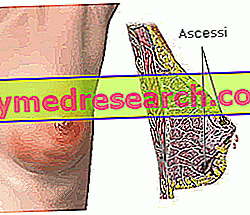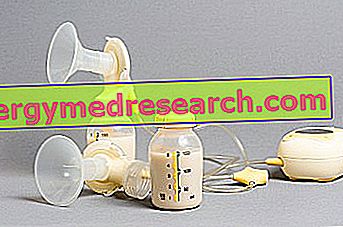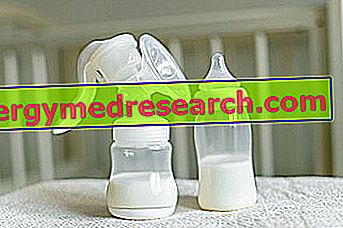Puerperal mastitis is an inflammatory process of infectious origin, which affects the breast during lactation or following its suspension. Although it affects a significant percentage of nurses (up to 10%), mastitis can first be prevented, but also cured without the need to suspend breastfeeding. Causes Puerperal mastitis is caused by the entry of germs into the galactophore ducts, small ducts that drain the milk up to the nipple
Category feeding time
Introduction Food and breastfeeding: problems Feeding during lactation is an essential factor in ensuring the correct production of milk in the nurse. Possible defects in the lactation (quantity and duration) or the chemical composition of the breast milk can negatively affect the infant's state of health (from the neonatal age up to the 6th month of life); this can happen for two reasons: Inadequate milk composition and consequent: Dissatisfaction with the nutritional requirements of the child Possible harmfulness due to contaminants etc
Generality Proper storage of breast milk is of fundamental importance to maintain the characteristics of the food and to ensure the safety of the child who will take it. Clearly, the preservation of breast milk is necessary when it is extracted (or pulled, if you prefer) from the breasts of the mother who cannot breastfeed her baby
Generality The electric breast pump is a very useful tool for all women who - due to factors of various origins and nature - cannot use breastfeeding. In order to guarantee correct milk extraction, without damaging the delicate breast tissue, the electric breast pump must be used in the appropriate manner
Generality The manual breast pump is a device used to extract milk from the breast when the mother cannot provide breastfeeding directly to the newborn. In fact, breast milk is an extremely valuable nutritional source for the baby, since it contains all the nutrients, enzymes, defense cells and antibodies necessary for its correct and healthy development
Definition Postpartum depression is a particular form of depressive disorder, which affects women in the period following birth. Usually, this form of depression develops over a few months and manifests itself with rather intense and lasting symptoms. It is a condition that greatly affects the ability to take care of the newborn, therefore, diagnosis and timely treatment are essential
Definition Mastitis is defined as an inflammatory process with a purely infectious etiology that involves the breast tissue; it is a pathological condition typical of the lactation period, but can also occur outside lactation. Generally, the mastitis that appears in the mother during the period between the birth of the baby and the following six weeks is called "puerperal"
What is Colostrum The secretion of the breast, which in women normally begins after childbirth (only exceptionally before), passes through three phases. As a result, the balance of nutrients in breast milk also changes during these three stages of breastfeeding: in the first 5 days the colostrum is produced transitional milk from the 5th-6th to the 10th day from the 10th to the 20th day (onwards) mature milk
Normally, milk flours represent the first food introduced during weaning; for the child they are therefore the first taste experience outside of breast milk. Practices - they are prepared instantly with the addition of boiling water - and nutrients, essentially consisting of milk, to which cereals and dehydrated fruit are eventually added
Women's milk is a specific product of the mammary gland and is a complex liquid that contains substances in solution, in emulsion and in colloid dispersion. Those in solution are represented by: sugars: lactose and simple sugars (oligosaccharides). Lactose is the prevailing sugar in quantity; mineral salts: sodium, potassium, chlorine, calcium
Nowadays, formulated milks have been industrially prepared, through various stages, starting from cow's milk, more and more refined, in order to be as chemically similar as possible to human milk and to better respond to the digestive and nutritional needs of the small infant, that is the baby of the first 4/6 months, all on the model of the breast-fed infant








